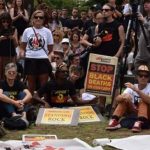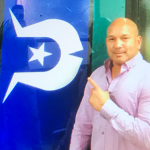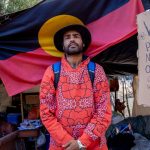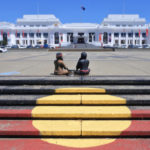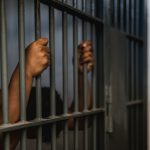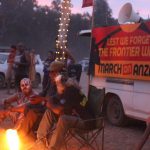Torres Strait Takes Australia to UN Over Climate Inaction: An Interview With 350’s Glen Klatovsky
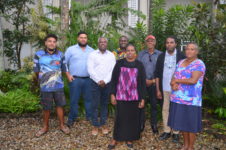
Eight Torres Strait Islander representatives from four different islands lodged an official complaint with the UN Human Rights Committee on 13 May against the Australian government over its complete inaction on climate change, which is threatening their island homes.
The Torres Strait Islander case asserts that the government’s lack of any viable action, along with its failure to implement any adaptation measures, amounts to it neglecting to fulfil its human rights obligations under the International Covenant on Civil and Political Rights.
Significantly, the complaint lodged with the UN committee is the first climate change litigation brought against the Australian government based on human rights, as well as being the first legal action globally to have been brought by the inhabitants of low-lying islands against a nation-state.
And Torres Strait locals are taking this action as the effects of rising sea levels are already taking their toll. One of the complaint authors, Warraber man Kabay Tamu said in a statement that having to leave their home would be like “colonisation all over again”, as they’d lose their land and culture.
Time is running out
The Torres Strait lies to the north of Cape York. At least 274 islands lie within the narrow stretch of water, with around four and half thousand people living there. The British began to colonise the area in 1862, and by 1879 the colony of Queensland had taken control of the islands.
The effects of climate change are very real in this region. Sea levels are rising annually at double the global average. And over recent years, unexpected and harsher weather is becoming more commonplace, with families on Yam Island left homeless last year.
So, last Saturday’s election result is quite a dire one for Torres Strait Island communities, given the inaction over, or complete denial of, the climate crisis that has been a signature of the Liberal Nationals government.
But, as the Torres Strait Islander communities take their complaint to the United Nations, it seems that a rising number of the wider Australian community is now embracing the need for action on this issue, as a number of recent polls have revealed, including one from the Lowy Institute.
A climate of change
Environmental law non-profit Client Earth will be representing the Torres Strait Islander communities at the United Nations, with Australian climate lawyer Sophie Marjanac acting as lead lawyer for the case.
And a local chapter of an international climate change organisation, 350 Australia is providing support to the action. The group has a focus on persuading governments and corporations to act on the climate emergency via grassroots organised campaigns.
Sydney Criminal Lawyers spoke to 350 Australia CEO Glen Klatovsky about the details of the climate change complaint, what he thinks of the Coalition’s record on the climate emergency and the silence surrounding the rising sea level crisis in the Torres Strait.
Firstly, the Torres Strait UN complaint is not only about the future impact government inaction is going to have on the Torres Strait islands, it includes the effect it’s already having. Glen, how is the climate emergency impacting these islands now?
People need to understand just how vulnerable these islands are. They sit between the tip of Cape York and Papua New Guinea. They’re very small. And they’re not very high above the surface of the sea.
So, Masig Island, which is one of them, is 2.7 kilometres long, 800 metres wide at its widest and has a maximum height above sea level of 6 metres. That island is incredibly exposed to the ocean. And as the ocean rises, there are a range of things happening.
Obviously, the ocean rise itself starts eroding the beach lines, and therefore, erodes away the island. But, also you get increased intensity of storms. You get king tides, and tides that are far more significant than they used to be. So, what happens is the island starts to get smaller in effect.
The impact of that for these islanders – who’ve been there for thousands of years and whose cultural identity as people is linked to the land – is that land is now disappearing, including for many of them the graves of their ancestors, which are culturally significant, as they would be for any of us.
What’s the main argument that the Torres Strait Islander communities have put forth in the complaint lodged with the UN committee? And what are these First Nations communities calling on the Australian government to do?
There are two main elements to the complaint. One is that the Australian government has really not responded to the climate emergency effectively over a long period of time.
And this current government simply does not have a suite of policies that would meet the Paris Agreement of commitments of a 1.5 degree world, which would provide a great deal more safety for these islands.
The second thing is the Australian government knows that these islands are under huge threat and in fact, that they’re eroding away right now, as we speak. And the Australian government has not put any money into trying to use adaptation measures to save these islands.
For example, there’s been assessment that a sea wall around some of these islands would protect them from the worst impacts of climate change. And that’s one measure by which we could protect these islands and these people could continue to have their home.
The Australian government has done nothing to take action to protect these islands. And these are Australian citizens. They are just like you and me. If our home was under threat like this, we would fight to the last to try and save it. And their long-term heritage and culture is part of this as well.
So, the complaint that has gone to the Human Rights Committee comes through the International Covenant on Civil and Political Rights. It includes the right to culture, the right to be free from arbitrary interference and the right to life.
For these people, those islands are their life. It is their culture. For anyone who is religious, it would be like seeing the home of your religion disappear under the ocean.
That’s the complaint. Now, the islanders want two sets of outcomes to what the two complaints are about.
The first set are about the Australian government taking greater action as a global citizen to decrease the impacts of climate change. That means having stronger targets, being a much more active citizen and also moving away from fossil fuels.
The second is that the Australian government commit to do everything it can to protect these islands from the impact of climate change.
Last Saturday saw the Morrison government re-elected. This means another three years of the Coalition, which has already been in power for almost six years. Your organisation has a focus on climate change, how would you describe the government’s track record when it comes to that?
Their track record has been appalling. Through the three prime ministers we’ve had in that five and a half years, the first one is a climate denier.
Tony Abbott as prime minister did everything he could to dismantle any action on climate change. He dismantled the Clean Energy legislation, which had started to see our emissions go down for the first time in a long time.
Now, since that has been abolished, our emissions are going back up again. And we are emitting more greenhouse gases.
He dismantled – or tried to dismantle – most of the administrative architecture of managing climate change. Luckily, some of those components were saved like ARENA and the Clean Energy Finance Corporation. But, a lot of it was dismantled.
So, we now have an Australian government that has incredibly low targets that in no way are going to take us towards a 1.5 degree warming situation that the Paris Agreement has committed us to. We have no mechanisms to meet those low targets.
The current government essentially has no climate change policy whatsoever. There’s no energy policy. There’s no policy on transport, which is the fastest growing source of emissions. There’s no policy on land management. There’s no policy on industrial emissions.
We currently have a government with a ridiculously low target and no ways to even meet that. And yet, we have Australians all over the country feeling the impact of climate change.
There are bushfires wiping out homes in many parts of regional Australia. Fires are also wiping out some of the most important national parks and world heritage areas. Heatwaves are killing people. Heatwaves have the hugest impact and just this year we had the hottest January ever in history.
This government is in no way looking at dealing with this issue either, in terms of slowing down the scale and impact of climate change or taking measures for those communities that are feeling the impacts, so that they can adapt to climate change.
Do you think of late, there’s been a shift in the wider community’s understanding of what’s actually happening with climate change?
Yes, it’s incredible. Most people would have seen that climate change was the number one issue identified by voters in this election.
Regarding the result of the election, there are many reasons why people vote. And we live in a democracy and a government was elected. It was elected on a whole range of issues.
But, there is no doubt that the number one issue for people was climate change. It was consistently climate change. And it didn’t change at all over the entire election.
One of the main reasons was the January we experienced. For most of us, it was scary how hot it was and how dangerous it was.
We also had all those stories from the Murray-Darling Basin. We had the terrible news about the Great Barrier Reef. We’ve had the bushfires and heatwaves.
People are really feeling the impacts of climate change. It is no longer a theoretical prospect. It is a day-to-day reality for all of us.
The drought, the images of it and what impacts it is having on farming communities in Australia is horrifying.
I lived through the Millennium drought in the 2000s. And now, I’m living through an even worse drought. Yes, we’ve always had droughts. But, we’ve never had droughts of this scale, this length and repeated so often.
We are clearly living climate change right now. And this government has no path to deal with it at all.
You’ve said that the government is wilfully ignoring what’s going on with climate change in the Torres Strait Islands. What sort of response does the government give to those communities in general?
As far as I understand, none at all. There’s been no responsiveness from federal government. They aren’t interested at all.
One of the goals of this legal action to the United Nations is to force the Australian government to wake up to the fact that there is this segment of the Australian community – Australian citizens, people like you and me – whose homes are disappearing, and the government is completely negligent and not paying any attention whatsoever.
And would that be some of the reason why people on the mainland are often more aware of a nation like Kiribati being threatened by rising sea levels, than they are of the threat to these islands that come under Australian jurisdiction?
Yes. We’ve been hearing the stories about the Pacific islands. And I work with the Pacific Island community every day. 350 has a big Pacific Island team and presence. And it’s a very similar story.
The obvious difference here is it’s the same story, but these are Australian citizens. These are people for whom the Australian government is directly responsible for. It doesn’t mean what’s happening in the Pacific islands is any more or less important. It’s of the same importance.
But, our Australian government should, at the very least, be looking after Australian citizens.
The complaint has been lodged with the UN Human Rights Committee. What’s the process like now?
It was lodged last Monday, 13 May. The committee will ask the Australian government to respond. And we expect that the response will be submitted in the second half of this year.
Then over 2020 there will be meetings and processes: ways of looking at the Australian response and trying to bring the complainants and the Australian government together.
Then the committee will come to a decision about whether their human rights have been violated probably in 2021.
And from there, Glen, what’s the best outcome the Torres Strait Islander communities can hope for via this process?
The United Nations cannot force the Australian government to do anything, even if they are found guilty of having violated their human rights. But, what they can do is they can show in front of the global community that the Australian government is failing their own citizens.
The other part is that we would like to see the Australian government wake up from its slumber and look at these Australian citizens that they have responsibilities for and say, “You know what? We are going to try and help out our own citizens.”
So, starting to take some real action, in terms of their approach on climate change as global citizens. But, also, in terms of just helping these people to find ways to stop their islands disappearing.
There are ways that can happen. And it costs a bit of money. But, that is what the Australian government is there for: to look after us.
And again, if it was my home or your home, and it was disappearing, and there were ways to stop that, you would expect our representatives to take that seriously and take some action.


